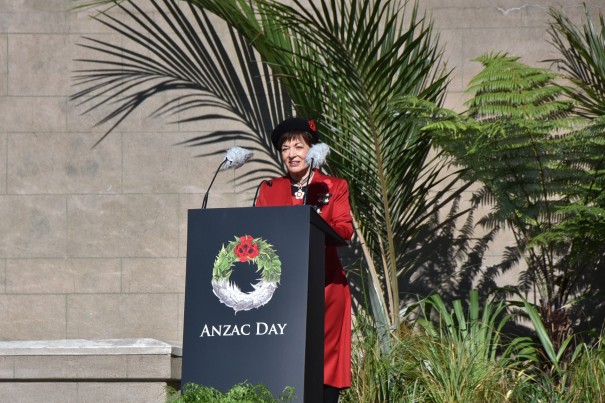Anzac Day National Service
Rere ana nga roimata o Hine

Tērā te pae, o Te Riri.
Huihuia mai tātau katoa
Tēnei te pae, o Maumahara.
E nga iwi, kei aku rangatira
Wahine ma, tāne mā
Tēnā tātau katoa.
The tears of Hine(rangi) flow, For those lost in battle.
We gather here today, In this place of Remembrance.
To all people, to our leaders, Women and men,
My greetings to you all.
I acknowledge The Hon Grant Robertson, Deputy Prime Minister
The Hon Meka Whaitiri, Minister for Veterans
His Excellency Leasi Papali’i Tommy Scanlon, High Commissioner for Samoa and Dean of the Diplomatic Corps
Her Excellency The Hon Patricia Forsythe, High Commissioner of Australia
Her Excellency Ömür Ünsay, Ambassador of the Republic of Turkey
Members of the Diplomatic Corps.
Nicola Willis MP
Air Marshal Kevin Short, Chief of Defence Force, and Sherryll Short
BJ Clark, President, Royal New Zealand Returned and Services Association
Taranaki Whānui
My Kaumatua Joe Harawira and Kuia Puhiwahine Tibble
Veterans and service personnel
Anzac Day is dedicated to all New Zealanders who have served our country in times of war, and to those who have lost their lives in the name of peace and freedom.
A year ago, we marked this day in isolation from each other, and we are indeed fortunate to be able to gather here this morning and share in this important national commemoration.
For some decades, New Zealanders have made a pilgrimage to Anzac commemorations at Gallipoli, and we are grateful to the Turkish Government for welcoming us to their country.
This year, while we cannot travel, we remember from afar those nations that share in our history in conflict.
Overseas, wherever New Zealanders may be, they will pause and think about the significance of Anzac Day.
I welcome all the veterans attending this service, and those listening from elsewhere, along with their families and whānau.
I make special mention of veterans of the Second World War, particularly those who were hoping to attend commemorations for the 75th anniversary of the end of the War last year, and were unable to, due to the pandemic.
Today, you are in our thoughts, as are all veterans of Jayforce and of subsequent conflicts – in Korea, Malaya/Malaysia, Vietnam, and Afghanistan – and of peacekeeping operations around the world.
I also acknowledge the members of today’s New Zealand Defence Force, who choose to follow a life of military service – a role that demands so much of them and their families.
Earlier this year, here at Pukeahu National War Memorial Park, Te Reo Hotunui o Te Moana-nui-a-Kiwa, the Pacific Islands Memorial, was dedicated in remembrance of all the Pacific peoples who have served our country.
The Memorial will be a lasting symbol of their service and sacrifice, and of New Zealand’s special bond with our Pacific neighbours.
The Pacific Islands Memorial joins the international memorials at Pukeahu as lasting tributes to the profound connections forged between nations in times of war and conflict.
As we reflect today on the destructive nature of war, we strengthen our resolve to act on the world stage in the spirit of friendship and reconciliation.
We remember our forebears, their sacrifice, and the values they strove to uphold.
We pay respect to the individual men and women who left families, friends, and communities behind to serve their country.
We acknowledge that some veterans were indelibly changed by their wartime experiences.
In his poem, ‘Tears etc.’ Denis Welch captures the feeling of alienation felt by many returned servicemen and women:
instead of the smell of death
there were stations, and faces,
and children thrust into our arms,
the old life reclaiming us,
tea, cups and saucers,
the sound of a single car in the street,
a plate held out with the future on it,
looks; unbridgeable silences;
tears etc.
In these lines, we recognise the scars of war and their lasting impact on individuals, families and communities.
A deeper knowledge and understanding of our history will enable us to arrive at a more confident understanding of who we are in the present – as well as a clearer vision of who we wish to be.
New Zealanders’ increasing interest in our history is evident in the numbers of New Zealanders attending Anzac Day commemorations, and the presence of so many younger people amongst those crowds.
Marking this sacred day of remembrance is part of that journey of understanding, and strengthens our resolve to be a model of peace and freedom for all.
Ka maumahara tonu tātou ki a rātou.
